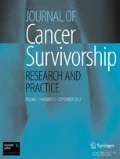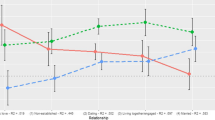Abstract
Purpose
Prostate cancer poses many challenges for both the man and his partner. Partners have reported a range of issues that impact their own mental health following their partner’s diagnosis of prostate cancer. The aim of this review is to summarise and critically evaluate the current literature reporting psychosocial intervention studies for partners of prostate cancer patients.
Methods
An extensive literature search of electronic databases was conducted (OvidMEDLINE 1946, 26th September 2013, and psychINFO 1967, 26th September 2013) using the keywords prostate cancer AND intervention* OR therapy* OR psychosocial intervention* OR support* AND couple* or Spouse* or Partner* or Intimate partner* matched to the title as well as secondary scanning of reference lists. Studies were included if they described interventions for partners of prostate cancer patients, either solely for the partners or as a couple, intended to alleviate distress and enhance the partner’s or couple’s quality of life, and reported a measurable outcome for partners.
Results
A total of 11 prostate cancer-specific intervention studies that included partners and reported separate results for the partners were found. Only one of these interventions was partner specific, the other eight involved the patient-partner dyad. The studies identified primarily focussed on two areas: emotional distress and sexual intimacy, and mixed findings were reported for efficacy of interventions.
Conclusions
Despite strong evidence that partners of men with prostate cancer experience difficulties associated with the impact of prostate cancer, there is limited research that has investigated the efficacy of psychosocial interventions for partners. Of the reviewed studies, it is evident that interventions targeting the reduction of emotional distress, improved communication and sexual intimacy between the couple and utilisation of strategies that enable partners to express their distress, learn new strategies and implement behavioural change show the most promising results in enhancing partner well-being.
Implications for Cancer Survivors
Significant progress is required in developing and evaluating appropriate and effective psychosocial support interventions for partners of prostate cancer survivors as partners appear to have significant unmet needs in this area.
Similar content being viewed by others
References
AIHW & AACR. Cancer in Australia 2012: an overview. Canberra: AIHW; 2012.
Lubeck DP, Litwin MS, Henning JM, Stoddard ML, Flanders SC, Carroll PR. Changes in health-related quality of life in the first year after treatment for prostate cancer: results from CaPSURE. Urology. 1999;53:180–6.
Nguyen LN, Pollack A, Zagars GK. Late effects after radiotherapy for prostate cancer in a randomized dose–response study: results of a self-assessment questionnaire. Urology. 1998;51:991–7.
Litwin MS, Melmed GY, Nakazon T. Life after radical prostatectomy: a longitudinal study. J Urol. 2001;166:587–92.
Wootten A, Burney S, Frydenberg M, Foroudi F, Ng K, Coleman G. Long-term experience of residual symptoms following treatment for localised prostate cancer: an Australian sample. Asia Pac J Clin Oncol. 2007;3:189–96.
Couper J, Bloch S, Love A, Macvean M, Duchesne GM, Kissane D. Psychosocial adjustment of female partners of men with prostate cancer: a review of the literature. Psychooncology. 2006;15:937–53.
Bottorff JL, Oliffe JL, Halpin M, Phillips M, McLean G, Mroz L. Women and prostate cancer support groups: the gender connect? Soc Sci Med. 2008;66:1217–27.
Badr H, Taylor CL. Sexual dysfunction and spousal communication in couples coping with prostate cancer. Psychooncology. 2009;18:735–46.
Carlson L, Bultz B, Speca M, St PM. Partners of prostate cancer patients: Part 1. Impact, adjustment, and coping across the illness trajectory. J Psychosoc Oncol. 2000;18:39–63.
Boehmer U, Clark JA. Communication about prostate cancer between men and their wives. J Fam Pract. 2001;50:226–31.
Suls J, Green P, Rose G, Lounsbury P, Gordon E. Hiding worries from One’s spouse: associations between coping via protective buffering and distress in male post-myocardial infarction patients and their wives. J Behav Med. 1997;20:333–49.
Pitceathly C, Maguire P. The psychological impact of cancer on patients’ partners and other key relatives: a review. Eur J Cancer. 2003;39:1517–24.
Resendes LA, McCorkle R. Spousal responses to prostate cancer: an integrative review. Cancer Invest. 2006;24:192–8.
Sanders S, Pedro LW, Bantum EO, Galbraith ME. Couples surviving prostate cancer: Long-term intimacy needs and concerns following treatment. Clin J Oncol Nurs. 2006;10:503–8.
Couper JW, Bloch S, Love A, Duchesne G, Macvean M, Kissane DW. The psychosocial impact of prostate cancer on patients and their partners. Med J Aust. 2006;185:428–32.
Manne S, Babb J, Pinover W, Horwitz E, Ebbert J. Psychoeducational group intervention for wives of men with prostate cancer. Psychooncology. 2004;13:37–46.
Feltwell AK, Rees CE. The information-seeking behaviours of partners of men with prostate cancer: a qualitative pilot study. Patient Educ Couns. 2004;54:179–85.
Evertsen JM, Wolkenstein AS. Female partners of patients after surgical prostate cancer treatment: interactions with physicians and support needs. BMC Fam Pract. 2010;11:19.
Rozmovits L, Ziebland S. What do patients with prostate or breast cancer want from an Internet site? A qualitative study of information needs. Patient Educ Couns. 2004;53:57–64.
Roussi P, Miller SM. Monitoring style of coping with cancer related threats: a review of the literature. J Behav Med 2014.
Pruchno RA, Resch NL. Husbands and wives as caregivers: antecedents of depression and burden. Gerontologist. 1989;29:159–65.
Neese LE, Schover LR, Klein EA, Zippe C, Kupelian PA. Finding help for sexual problems after prostate cancer treatment: a phone survey of men’s and women’s perspectives. Psychooncology. 2003;12:463–73.
Galbraith ME, Fink R, Wilkins GG. Couples surviving prostate cancer: challenges in their lives and relationships. Semin Oncol Nurs. 2011;27:300–8.
Filiault SM, Drumond MJN, Smith JA. Gay men and prostate cancer: voicing the concerns of a hidden population. J Mens Health. 2008;5:327–32.
Collins AL, Love AW, Bloch S, Street AF, Duchesne GM, Dunai J, et al. Cognitive existential couple therapy for newly diagnosed prostate cancer patients and their partners: a descriptive pilot study. Psychooncology. 2013;22:465–9.
Hampton AJ, Walker LM, Beck A, Robinson JW. A brief couples’ workshop for improving sexual experiences after prostate cancer treatment: a feasibility study. Support Care Cancer. 2013;21:3403–9.
Walker LM, Hampton AJ, Wassersug RJ, Thomas BC, Robinson JW. Androgen deprivation therapy and maintenance of intimacy: a randomized controlled pilot study of an educational intervention for patients and their partners. Contemp Clin Trials. 2013;34:227–31.
McCorkle R, Siefert ML, Dowd MF, Robinson JP, Pickett M. Effects of advanced practice nursing on patient and spouse depressive symptoms, sexual function, and marital interaction after radical prostatectomy. Urol Nurs. 2007;27:65–77. discussion 8–80.
Manne SL, Kissane DW, Nelson CJ, Mulhall JP, Winkel G, Zaider T. Intimacy-enhancing psychological intervention for men diagnosed with prostate cancer and their partners: a pilot study. J Sex Med. 2011;8:1197–209.
Wittmann D, He C, Mitchell S, Wood Jr DP, Hola V, Thelen-Perry S, et al. A one-day couple group intervention to enhance sexual recovery for surgically treated men with prostate cancer and their partners: a pilot study. Urol Nurs. 2013;33:140–7.
Badger TA, Segrin C, Figueredo AJ, Harrington J, Sheppard K, Passalacqua S, et al. Psychosocial interventions to improve quality of life in prostate cancer survivors and their intimate or family partners. Qual Life Res. 2011;20:833–44.
Northouse LL, Mood DW, Schafenacker A, Montie JE, Sandler HM, Forman JD, et al. Randomized clinical trial of a family intervention for prostate cancer patients and their spouses. Cancer. 2007;110:2809–18.
Canada AL, Neese LE, Sui D, Schover LR. Pilot intervention to enhance sexual rehabilitation for couples after treatment for localized prostate carcinoma. Cancer. 2005;104:2689–700.
Campbell LC, Keefe FJ, Scipio C, McKee DC, Edwards CL, Herman SH, et al. Facilitating research participation and improving quality of life for African American prostate cancer survivors and their intimate partners. A pilot study of telephone-based coping skills training. Cancer. 2007;109:414–24.
Harden J, Falahee M, Bickes J, Schafenacker A, Walker J, Mood D, et al. Factors associated with prostate cancer patients’ and their spouses’ satisfaction with a family-based intervention. Cancer Nurs. 2009;32:482–92.
Perez MA, Skinner EC, Meyerowitz BE. Sexuality and intimacy following radical prostatectomy: patient and partner perspectives. Health Psychol. 2002;21:288–93.
Donnelly JM, Kornblith AB, Fleishman S, Zuckerman E, Raptis G, Hudis CA, et al. A pilot study of interpersonal psychotherapy by telephone with cancer patients and their partners. Psychooncology. 2000;9:44–56.
Chambers SK, Ferguson M, Gardiner RA, Nicol D, Gordon L, Occhipinti S, et al. ProsCan for men: randomised controlled trial of a decision support intervention for men with localised prostate cancer. BMC Cancer. 2008;8:207.
Conflict of interest
The authors have no conflicts of interest to declare.
Author information
Authors and Affiliations
Corresponding author
Rights and permissions
About this article
Cite this article
Wootten, A.C., Abbott, J.M., Farrell, A. et al. Psychosocial interventions to support partners of men with prostate cancer: a systematic and critical review of the literature. J Cancer Surviv 8, 472–484 (2014). https://doi.org/10.1007/s11764-014-0361-7
Received:
Accepted:
Published:
Issue Date:
DOI: https://doi.org/10.1007/s11764-014-0361-7




